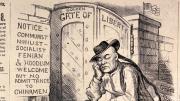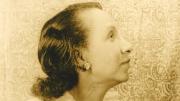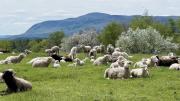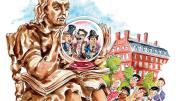Dennis De Witt inquires about the origin of the phrase “wretched excess.” He has found citations to The Edinburgh Review (1805), Sir Walter Scott (c. 1830), and the sixteenth-century Jesuit Martin Delrio, but hopes to learn more.
Alethea Black asks who wrote: “What is the thing which man will not surrender? That which he never fully possessed, or missed in its true season.”
William Benemann seeks the source of a motto tattooed on the arm of a Massachusetts sailor in 1872: “Not a star shall fall.” He has found the phrase in the farewell speech that Colonel J.J. Seaver gave to the men of the Sixteenth New York Volunteers at the end of the Civil War, but further online searches suggest that Seaver was quoting an earlier source.
Eve Menger would like to learn “the earliest usage of the word ‘Union’ in distinction to ‘Confederacy.’ Union Square in San Francisco is said to have been named in honor of pro-Union, anti-slavery rallies held there, led by the Unitarian minister Thomas Starr King. However, there is an 1853 newspaper article which refers to that area as Union Square. Was ‘Union’ used at that time in the political sense?”
Truth in the well (November-December 2016). No links to Harvard’s Pump have emerged, but John Gordon and Jenny Rood, citing The Oxford Book of Proverbs, noted that “We know nothing certainly, for truth lies in the deep” is attributed to Democritus, and the revision, “Truth lies sunk in a well,” to Lactantius (Institutiones Divinae III, xxviii). Gordon added that Judith Oster, in Toward Robert Frost: The Reader and the Poet (page 82) cites Democritus for “Of truth we know nothing, for truth lies at the bottom of a well.” In addition, Bernard Witlieb shared Jean-Léon Gérôme’s painting, Truth Emerging from Her Well (with a whip to use on humanity), and Louise Abbot recalled Sully Prudhomme’s sonnet, “Le doute,” beginning: La blanche Vérité dort au fond d’un grand puits.
“between…business and eternity” (November-December 2016). Joseph Marcus identified the speaker as English bishop Zachary Pearce (said to be citing a reply first made to Emperor Charles V), based on Hugh James Rose’s A New General Biographical Dictionary (1850; vol. 2, page 3).
Send inquiries and answers to “Chapter and Verse,” Harvard Magazine, 7 Ware Street, Cambridge 02138 or via email to chapterandverse@harvardmag.com.








